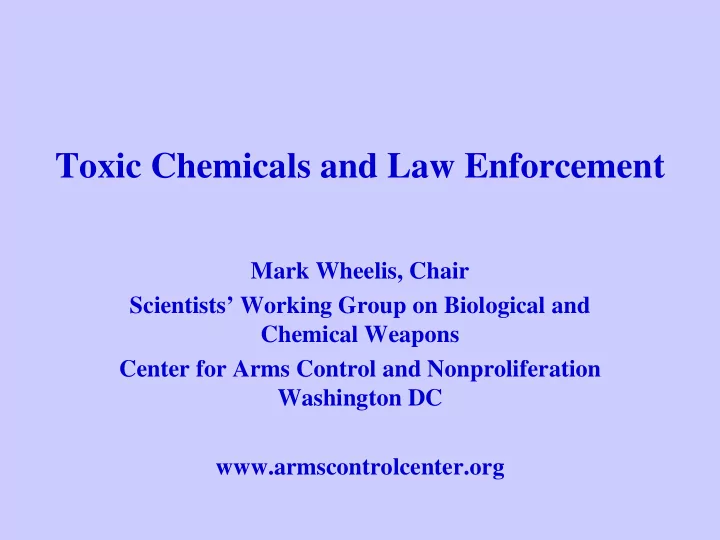

Toxic Chemicals and Law Enforcement Mark Wheelis, Chair Scientists’ Working Group on Biological and Chemical Weapons Center for Arms Control and Nonproliferation Washington DC www.armscontrolcenter.org
Chemical weapons are: Toxic chemicals and their precursors, except where intended for purposes not prohibited by the Convention, as long as the types and quantities are consistent with such purposes (II.1.a)
A toxic chemical is: Any chemical which through its chemical action on life processes can cause death, temporary incapacitation or permanent harm to humans or animals (II.2)
Included under purposes not prohibited by the Convention is: law enforcement including domestic riot control (II.9.d) Note: this is unique among purposes not prohibited, in allowing the employment of the toxic properties of chemicals against humans
What chemicals may be used for law enforcement? Riot-control agents Incapacitants?
Incapacitants Chemicals used under such conditions that they produce temporary physiological and/or mental effects which render individuals incapable of concerted effort in the performance of specific tasks, with very low lethality and permanent damage Many types of incapacitation are conceivable, but principal focus is on anesthetics (causing unconsciousness) By definition these are toxic chemicals
Technical Issues in Incapacitant Use Difficulty of controlling dose -steep concentration gradients in aerosols -inability of victims to flee and thus limit dose Wide variation in human susceptibility Narrow safety margins (ratio of lethal dose to effective dose) Other mechanisms of permanent harm or death -airway obstruction -accident Other
These technical issues raise serious concerns about the ability to adequately control the levels of lethality and permanent damage to levels appropriate for law enforcement and consistent with human rights law In effect, chemicals that meet the definition of incapacitants under controlled clinical or laboratory conditions may not fit that definition in the uncontrolled conditions of use in the field
Recommendation 1 We therefore recommend that the Review Conference consider initiating a mechanism to determine what features would need to characterize a toxic chemical, and the conditions of its use, in order for it to be appropriate for law enforcement, and legal under international law; and what specific chemicals, if any, meet these requirements
Transparency Holdings of schedule 1, 2, and 3 chemicals, as well as RCAs, must be declared No such provision for other chemicals held for law enforcement If any incapacitants are held for this purpose, there will be a lack of transparency about State Party practice
Recommendation 2 We therefore recommend that the Review Conference consider developing a mechanism by which States Parties are required to declare all toxic chemicals held for law enforcement purposes
Recommendation 3 We further recommend that, until such time as a declaration measure for all chemicals held for law enforcement is developed, States Parties make use of the consultation, cooperation and fact-finding measures in Article IX to clarify state practice with regard to such chemicals and to enhance transparency and confidence.
Other Transparency Measures In the absence of a formal declaration process for incapacitants held for law enforcement purposes, and in parallel with Article IX activities, States Parties might consider other measures that would contribute to transparency -e.g., States Parties could voluntarily declare any such holdings, or declare that they do not hold any stockpiles of incapacitants for use in law enforcement
Toxic Chemicals and Law Enforcement Mark Wheelis, Chair Scientists’ Working Group on Biological and Chemical Weapons Center for Arms Control and Nonproliferation Washington DC www.armscontrolcenter.org
Recommend
More recommend